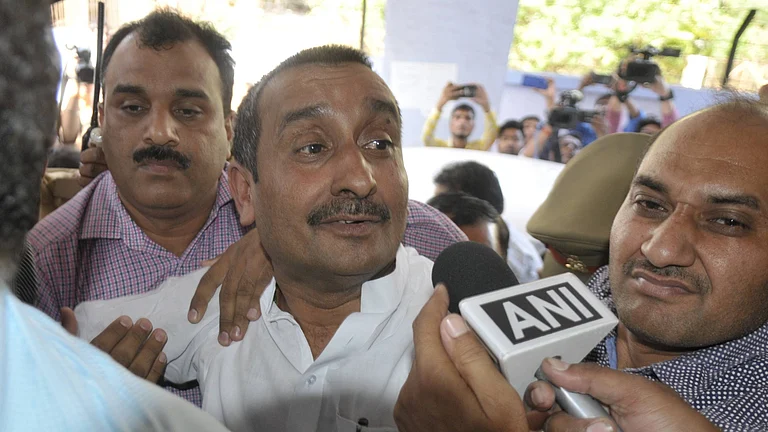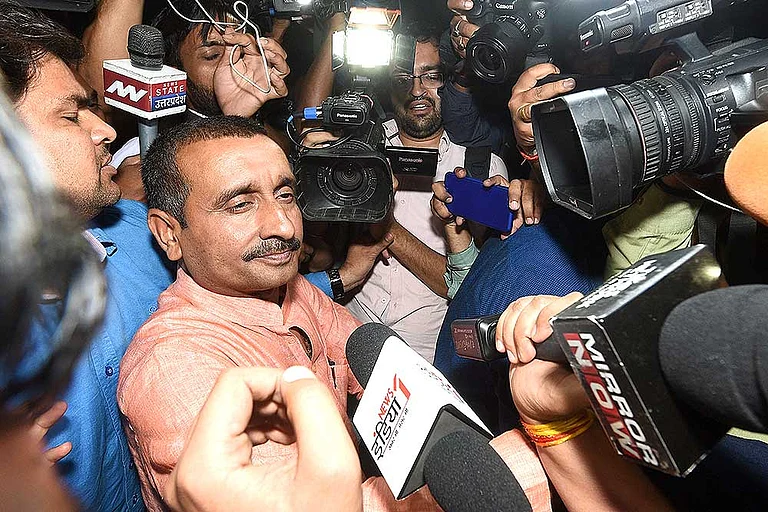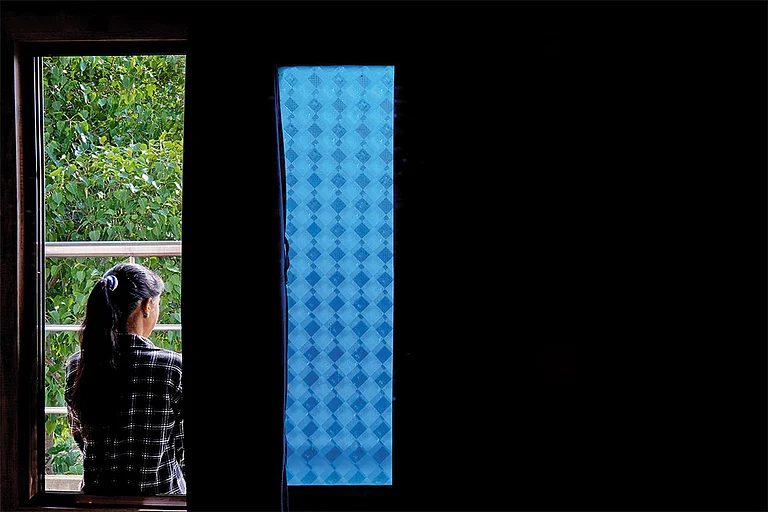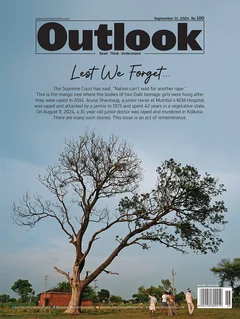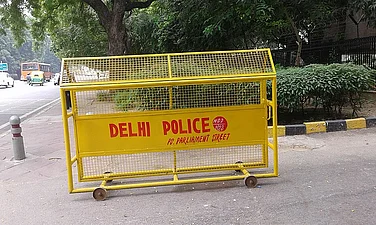This is the cover story for Outlook's 11 September 2024 magazine issue 'Lest We Forget'. To read more stories from the issue, click here
In a tranquil village perched high atop the mountainscape of Kotkhai, accessible only through a gruelling climb on foot, a traditional home nestled amidst lush apple orchards holds a painful, poignant memory. On the wooden wall of the living room, two photographs have been hung with quiet reverence. One captures the radiant smile of a teenage girl in school uniform, her hair braided and a backpack slung over her shoulders. The other is the portrait of a face that smiles with innocence, now shadowed by profound grief.
These images are symbols of cherished memories and heart-wrenching moments, embodying the enduring spirit of a 16-year-old daughter, whose voice still echoes in Halaila forest’s eerie silence. This was the 5-km path to school she used to brave every day, driven by her desire for a brighter future.
Her grieving mother frequently takes down the photograph, gently wipes away the dust, and then places it back. When the morning sun lights up the room, she stands there motionlessly in reverence. Her eyes well up. Every tear is a testament to the heart-wrenching and horrifying loss of a daughter, whose boundless energy used to inspire her family. It’s been almost seven years now since Gudiya (a Class X student, nicknamed posthumously), the youngest of the family’s six daughters, went missing in the Halaila forest. On July 4, 2017, Gudiya went missing on the way back home from Government Senior Secondary School, Mahasu (Kotkhai). Three days later, a police First Information Report (FIR) was lodged, and her fully naked body was found in the forest, barely a few metres away from the path she used to take. Despite the absence of a motorable road to the village, she had decided to walk to school through the forest path to get the best education, believing in her potential to reach great heights. The path she travelled to school each day, a path to her dreams, had turned treacherous.
“I often used to warn her about wild bears and leopards,” says the 60-year-old father of the deceased. “Even pulled out my son from the local school to keep her company. I never knew the real threat was not from wild animals but the beasts in human form.”

The Gudiya rape and murder case, which deeply affected Himachal Pradesh in 2017—an election year—remains vivid in public memory till date. This case serves as a stark reminder of other brutal incidents, including the Nirbhaya gang rape in Delhi, the sexual assault of a 19-year-old Dalit woman in Hathras, Uttar Pradesh, and the recent rape-murder of a young doctor in Kolkata.
Gudiya’s father reflects, “Each time I read about the rape and murder of young girls, my blood boils and my heart aches for the victims’ families. I can’t help but wonder, has India become a country plagued by such horrors? Why is sexual violence against women and girls so pervasive?”
The solution, he says, is “death, hang them or shoot them. There is no other way left.” The grieving father laments that the family continues to await justice. The shock and grief of July 7, 2017—the day her body was found—is a stark reminder of a barbaric crime. This was not the act of a single individual, but a gang, potentially composed of drug addicts.
“My daughter was neither submissive nor weak,” says her father. “She had the strength and resilience to defend herself against any assault. It looks like she was overpowered, abducted by four or five youths. They committed this heinous crime. After the FIR was lodged and the police started searching, they killed her. The body was dumped on July 7 morning. The investigations were severely mishandled and compromised to save the culprits. We have lost faith in the system and its mechanisms for delivering justice.”
After the incident, many parents had pulled their children out of the school. Gudiya’s brother, who was 15 at the time of the tragedy, now studies at Government College, Theog. “My sister also wished to study at the college and thereafter go for her higher studies,” he sighs.
Gudiya’s mother’s pain is unbearable. “The grief of a mother whose daughter falls victim to such a grave sexual crime cannot be understood by anyone but herself. It’s a mother who carries a child in her womb for nine months, nurturing and protecting her. This tragedy has completely changed our lives...She must have cried out for help, called out to me to save her, but even God turned powerless to intervene,” she says, wiping away her tears.
Gudiya’s hopes and dreams were wrecked forever. Her family was plunged into the depths of despair. There is profound grief and anger within her home. Her two photos, a few trophies she had won in competitions and her school badges, are the only mementos the family has now, besides the memories about her unfulfilled dreams. “The police took away everything—her school bag, text books, note books and uniform, and have not returned a single article. They (the police) told us everything got burnt in the Kotkhai police station, which was set on fire by protesters after the incident,” says her mother. “She used to draw beautiful sceneries of mountains, forests and natural surroundings. Lord Krishna was her most adored God. She made some paintings of Lord Krishna, out of interest in art and drawing. She was a person full of life and dreams, with an indomitable spirit.”
At home with local traditions and hill customs, she was her family’s pride, excelling in studies and balancing the household chores. A true Pahari girl! She had no interest in mobile phones, unlike many kids her age. Watching TV, mostly songs and films, was her favourite hobby. She often used to watch TV till midnight but used to wake up early and get ready for school on her own. Gudiya used to say she would take up higher studies and make the family proud academically and career-wise, her mother recalls. Dancing was her greatest love. She performed in school and inter-school events and won prizes.
***
On the day that Gudiya went missing, the school had organised a sports tournament. Her younger brother and other schoolmates from her village, who usually used to accompany her, stayed back. But she decided to walk home alone—a one-hour journey on foot, through the lonely forest track. As she did not return home till late evening, an immediate search began to trace her. The family lodged an FIR at Kotkhai police station. Two days later, the police found her body dumped in the same forest, barely a few metres away from the road.
The autopsy done by a team of doctors at Indira Gandhi Medical College (IGMC) Shimla confirmed rape and murder. The incident triggered massive protests, dharnas and uproar at Kotkhai, Shimla, and other parts of the state because such a gruesome crime against women is rare here. At the intervention of the High Court, which took up the matter as a PIL, based on media reports, a CBI probe was ordered into the case. Nine months after the crime, the CBI arrested 28-year-old woodcutter Anil Kumar alias Neelu as the sole accused on the basis of forensic evidence (DNA profiling).
A local court on June 18, 2021, held the accused guilty under Sections 376 (2) (i), 376 (A), and 302 of the Indian Penal Code and Section 4 of the Protection of Children from Sexual Offences (POCSO) Act and sentenced him to life imprisonment. He is currently lodged at Model Central Jail, Kanda in Shimla.
The father of the victim says that during the past seven years, he had knocked on every door and met the highest authorities of the state. Everybody seems to be washing their hands off the case.
The family says the actual culprits still remain at large and have joined a legal battle to bring closure to the tragedy. “The family’s fight for justice for Gudiya is still on,” says her father, who claims that the woodcutter has been framed by the CBI to save the real accused, who belong to influential families of the apple orchard owners.
Madad Sewa Trust, an NGO fighting for justice for Gudiya, has filed a petition in the Himachal Pradesh High Court asking for reinvestigation. “There are serious gaps in the investigation. The CBI has not done a proper job. The opinion of the forensic experts about the involvement of two or more persons has been ignored. We also knocked on the doors of the Supreme Court, which has referred the case back to the High Court. The petition is admitted but no next date has been given” says Vikas Thapta, who heads Madad Sewa Trust. The Trust has handed over several citations of the Supreme Court and High Court judgements justifying reinvestigations in the case. “We are determined to take the legal battle to the logical end,” says Thapta.
Former Shimla Mayor and social activist Tikender Singh Panwar points out that the Gudiya case demonstrates the vulnerability of girls, not only in major urban centres and public spaces but also in rural and mountainous areas. Currently carrying on a movement under the banner of the “Shimla Collective” to protest against the rape and murder of the medical professional at Kolkata, Panwar says, “From a legal perspective, justice appears to have been served with the conviction of an individual (Neelu) arrested by the CBI in the Gudiya case. However, whether true justice has been done to Gudiya remains uncertain. Several questions persist, including whether the crime was a gang rape or committed by a single perpetrator, as the CBI has identified only one rapist,” he states.
Panwar notes that Gudiya’s parents continue to believe that the actual perpetrators remain at large. There are also claims that the Himachal Pradesh Police, who initially investigated the case, were on the right track. Thus, the question of whether justice has been fully delivered to Gudiya remains unresolved, particularly in the public’s mind and that of her family members. This sentiment reflects widespread uncertainty about the case’s resolution, according to Panwar.
MORE FROM THIS ISSUE
The father of the victim says that during the past seven years, he had knocked on every door and met the highest authorities of the state. Everybody seems to be washing their hands off the case. “Yet, the fight will go on till justice is finally meted out,” he declares.
(This appeared in the print as 'The Forest of Loss')







